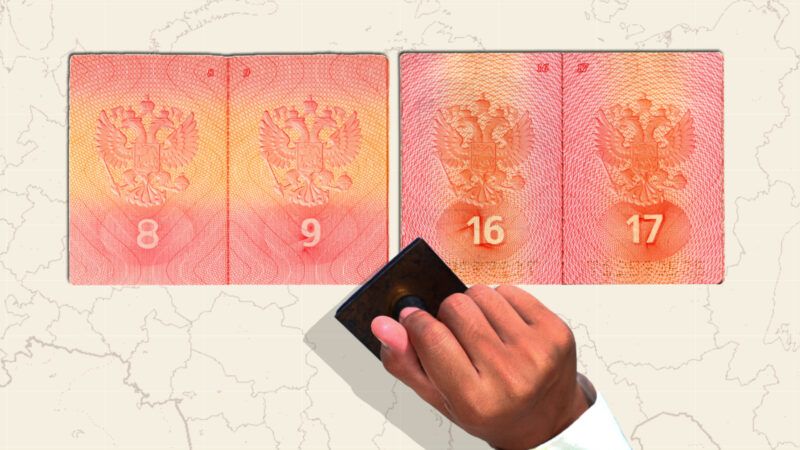Closing Borders to Russians Only Helps Putin
Ukrainian President Volodymyr Zelenskyy has said that Russians should "live in their own world until they change their philosophy." But keeping Russians isolated plays into Putin's hands.

Nearly six months into the Russian invasion of Ukraine, Ukrainian forces are still holding their own against Russia. Foreign nations have funneled huge amounts of military and humanitarian aid to Ukraine while imposing sanctions that affect Kremlin elites and ordinary Russians alike.
But some want those measures to go further. In an interview with The Washington Post earlier this month, Ukrainian President Volodymyr Zelenskyy said that Russians should "live in their own world until they change their philosophy." In practical terms, he suggested that countries should "close the borders" to Russian citizens. "Whichever kind of Russian," he said, "make them go to Russia."
A number of nations have taken steps to prevent Russians from entering. So far, the Czech Republic, Lithuania, Estonia, Latvia, and Poland have decided to stop issuing certain visas to Russian citizens. Finland will be slashing its current level of Russian tourist visas by 90 percent. "It's not right that at the same time as Russia is waging an aggressive, brutal war of aggression in Europe," said Finnish Prime Minister Sanna Marin, "Russians can live a normal life, travel in Europe, be tourists."
But these measures won't just affect tourists. According to LETA, a Latvian news agency, the Latvian Ministry of the Interior has prepared amendments to the country's immigration law in order to "stop issuing…temporary residence permits (TUAs) to citizens of Russia and Belarus," which "will affect employers' opportunities to continue employment with migrant workers from both neighboring countries."
European Union foreign ministers are expected to discuss the issue of Russian visas on August 31. Ahead of that meeting, many major figures—including people within the Zelenskyy administration—have argued against a blanket ban on visas for Russians. They recognize the ethical and practical issues that come with punishing civilians for the actions of an authoritarian government they can't feasibly control.
Oleksiy Arestovych, a military adviser to Zelenskyy, told The Washington Post that he's "not a supporter of collective responsibility [but of] individual." While it might be reasonable to sanction those who overtly support Russian President Vladimir Putin, he said, he favored a "more selective" approach to visa denials for Russians.
German Chancellor Olaf Scholz likewise has rejected the idea of an E.U.-wide ban on Russian tourists, arguing that such a measure "would undermine the purpose and effect of targeted sanctions that have been applied to those supporting the war," explains Politico. "This is not the war of the Russian people, but it is Putin's war," Scholz said at a press conference last week. "It is important to us to understand that there are a lot of people fleeing from Russia, because they are disagreeing with the Russian regime."
Enforcing visa restrictions on Russians may prove to be logistically difficult, especially if only certain visa categories are targeted. European officials aren't united on the issue of a visa ban, let alone who it should include. While Ukrainian Foreign Minister Dmytro Kuleba has stressed that "those few Russians who may need an asylum or humanitarian entry" shouldn't be banned, Zelenskyy has previously argued that Russians studying abroad in Europe should be sent home. Limiting entry just to Russians who don't support Putin, meanwhile, would require visa-issuing authorities to make any number of subjective judgments (a complication that Arestovych suggests may have pushed Zelenskyy to favor a blanket ban).
Zelenskyy argues that limiting the movement of Russian travelers should be done "until they change their philosophy." But keeping Russians in Russia isn't the right approach to encourage them to change their views. For one, the Kremlin has censored all manner of information about the war. Back in March, it blocked access to Facebook. It's cracked down on journalists and foreign websites, censoring sites like BBC, Radio Free Europe/Radio Liberty, and Deutsche Welle. And in March, Putin signed a law that would dole out prison sentences of up to 15 years for those who circulate "false news" about the invasion. Russia arrested over 13,000 anti-war protesters in just the first two weeks after the war began.
Isolating Russians will be counterproductive. Allowing them to travel will surely bring them some measure of joy, but it will also give them access to views and insights on the invasion of Ukraine that they'd be hard-pressed to find at home. Fencing Russians off from freer nations will ensure that they're kept in a hostile information environment, deprived of experiences that may make them more amenable to freedom and more hostile to their current regime. What's more, it could keep certain vulnerable groups—like LGBT people or political dissidents—from leaving for safer places.
A sweeping visa ban would harm the Russian citizens that could very well benefit either from an escape route or exposure to ideas outside Russia's borders. Keeping them isolated will only trap them in a country rife with censorship and risk alienating them from the West, playing directly into Putin's hands.
Show Comments (29)